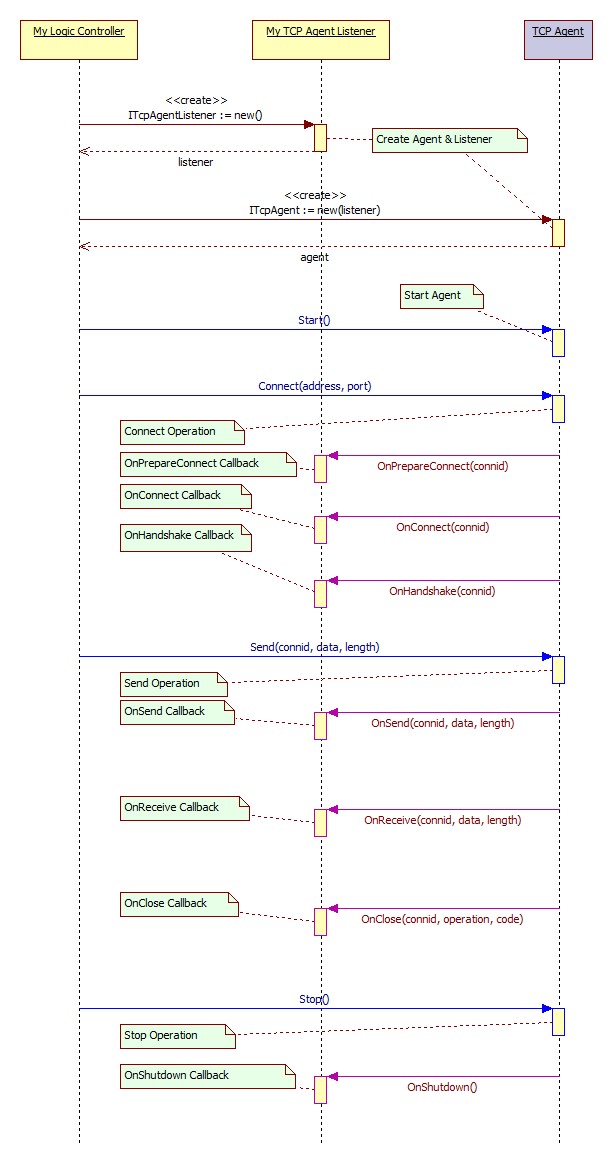High Performance Network Framework
Description
- Server Based on IOCP/EPOLL communication model, combined with technology of memory pool, private heap etc., efficient memory management is implemented to support large scale and high concurrent communication scenarios.
- Agent The Agent component is essentially a Multi-Client component that uses the same technical architecture as the Server component. An Agent component object can create and efficiently handle large-scale Socket connections at the same time.
- Client Based on Event-Select/POLL communication model, each component object creates a communication thread and manages a Socket connection. Client components are suitable for small-scale client scenarios.
Document
- HP-Socket Development Guide [pdf]
- HP-Socket Class Diagram [uml]
- HP-Socket Class Diagram [jpg]
- HP-Socket SSL Class Diagram [jpg]
- HP-Socket HTTP Class Diagram [jpg]
Workflow
- Create listener object
- Create component object (and binding with listener object)
- Start component object
- Connect to dest host (for Agent Component only)
- process network events (OnConnect/OnReceive/OnClose etc.)
- Stop component object (optional: component object will be stopped before destroy in step 7)
- Destroy component object
- Destroy listener object
Example
- C++ Example
#include <hpsocket/HPSocket.h>
/* Listener Class */
class CListenerImpl : public CTcpPullServerListener
{
public:
// 5. process network events
virtual EnHandleResult OnPrepareListen(ITcpServer* pSender, SOCKET soListen);
virtual EnHandleResult OnAccept(ITcpServer* pSender, CONNID dwConnID, UINT_PTR soClient);
virtual EnHandleResult OnHandShake(ITcpServer* pSender, CONNID dwConnID);
virtual EnHandleResult OnReceive(ITcpServer* pSender, CONNID dwConnID, int iLength);
virtual EnHandleResult OnSend(ITcpServer* pSender, CONNID dwConnID, const BYTE* pData, int iLength);
virtual EnHandleResult OnClose(ITcpServer* pSender, CONNID dwConnID, EnSocketOperation enOperation, int iErrorCode);
virtual EnHandleResult OnShutdown(ITcpServer* pSender);
};
int main(int argc, char* const argv[])
{
// 1. Create listener object
CListenerImpl s_listener;
// 2. Create component object (and binding with listener object)
CTcpPullServerPtr s_pserver(&s_listener);
// 3. Start component object
if(!s_pserver->Start("0.0.0.0", 5555))
exit(1);
/* wait for exit */
// ... ...
// 6. (optional) Stop component object
s_pserver->Stop();
return 0;
// 7. Destroy component object automatically
// 8. Destroy listener object automatically
}- C Example
#include <hpsocket/HPSocket4C.h>
// 5. process network events
EnHandleResult __HP_CALL OnConnect(HP_Agent pSender, HP_CONNID dwConnID);
EnHandleResult __HP_CALL OnReceive(HP_Agent pSender, HP_CONNID dwConnID, int iLength);
EnHandleResult __HP_CALL OnSend(HP_Agent pSender, HP_CONNID dwConnID, const BYTE* pData, int iLength);
EnHandleResult __HP_CALL OnClose(HP_Agent pSender, HP_CONNID dwConnID, En_HP_SocketOperation enOperation, int iErrorCode);
EnHandleResult __HP_CALL OnShutdown(HP_Agent pSender);
int main(int argc, char* const argv[])
{
HP_TcpPullAgentListener s_listener;
HP_TcpPullAgent s_agent;
// 1. Create listener object
s_listener = ::Create_HP_TcpPullAgentListener();
// 2. Create component object (and binding with listener object)
s_agent = ::Create_HP_TcpPullAgent(s_listener);
/* Set listener callbacks */
::HP_Set_FN_Agent_OnConnect(s_listener, OnConnect);
::HP_Set_FN_Agent_OnSend(s_listener, OnSend);
::HP_Set_FN_Agent_OnPullReceive(s_listener, OnReceive);
::HP_Set_FN_Agent_OnClose(s_listener, OnClose);
::HP_Set_FN_Agent_OnShutdown(s_listener, OnShutdown);
// 3. Start component object
if(::HP_Agent_HasStarted(s_agent))
exit(1);
// 4. Connect to dest host
::HP_Agent_Connect(s_agent, "remote.host.1", REMOTE_PORT_1, nullptr);
::HP_Agent_Connect(s_agent, "remote.host.2", REMOTE_PORT_2, nullptr);
::HP_Agent_Connect(s_agent, "remote.host.3", REMOTE_PORT_3, nullptr);
/* wait for exit */
// ... ...
// 6. (optional) Stop component object
::HP_Agent_Stop(s_agent);
// 7. Destroy component object
::Destroy_HP_TcpPullAgent(s_agent);
// 8. Destroy listener object
::Destroy_HP_TcpPullAgentListener(s_listener);
return 0;
}Component List
- Basic Components
- SSL Components
- HTTP Components



